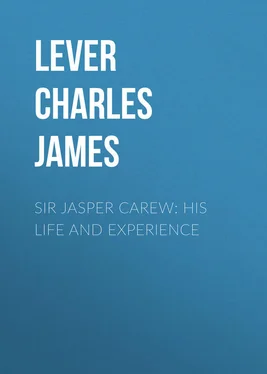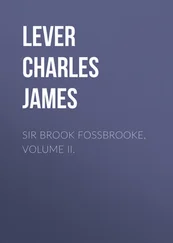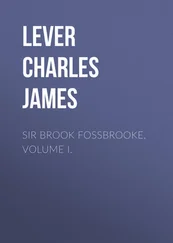Charles Lever - Sir Jasper Carew - His Life and Experience
Здесь есть возможность читать онлайн «Charles Lever - Sir Jasper Carew - His Life and Experience» — ознакомительный отрывок электронной книги совершенно бесплатно, а после прочтения отрывка купить полную версию. В некоторых случаях можно слушать аудио, скачать через торрент в формате fb2 и присутствует краткое содержание. Жанр: literature_19, foreign_antique, foreign_prose, на английском языке. Описание произведения, (предисловие) а так же отзывы посетителей доступны на портале библиотеки ЛибКат.
- Название:Sir Jasper Carew: His Life and Experience
- Автор:
- Жанр:
- Год:неизвестен
- ISBN:нет данных
- Рейтинг книги:5 / 5. Голосов: 1
-
Избранное:Добавить в избранное
- Отзывы:
-
Ваша оценка:
- 100
- 1
- 2
- 3
- 4
- 5
Sir Jasper Carew: His Life and Experience: краткое содержание, описание и аннотация
Предлагаем к чтению аннотацию, описание, краткое содержание или предисловие (зависит от того, что написал сам автор книги «Sir Jasper Carew: His Life and Experience»). Если вы не нашли необходимую информацию о книге — напишите в комментариях, мы постараемся отыскать её.
Sir Jasper Carew: His Life and Experience — читать онлайн ознакомительный отрывок
Ниже представлен текст книги, разбитый по страницам. Система сохранения места последней прочитанной страницы, позволяет с удобством читать онлайн бесплатно книгу «Sir Jasper Carew: His Life and Experience», без необходимости каждый раз заново искать на чём Вы остановились. Поставьте закладку, и сможете в любой момент перейти на страницу, на которой закончили чтение.
Интервал:
Закладка:
“I ‘ll go abroad again! I ‘ve lived too long out of this wasps’ nest to endure the eternal buzzing and stinging that goes on around me.”
“I think you ‘re right there,” said MacNaghten.
My father made no reply, and looked anything but pleased at the ready concurrence in his plan.
“We shall never understand them, nor they us,” said he, peevishly, after a pause.
MacNaghten nodded an affirmative.
“The Duke, of course, then, remains here?” said Dan, after a pause.
“Of course he does not,” replied my father, pettishly; “he has announced to me the urgent necessity of his return to Dublin, nor do I see that anything has since occurred to alter that contingency.”
The tone in which he had spoken these words showed not only how he felt the taunt implied in Dan’s remark, but how sincerely to his own conscience he acknowledged its justice. There was no doubt of it! My father’s patriotism, that withstood all the blandishments of “Castle” flattery, all the seductions of power, and all the bright visions of ambition, had given way under the impulse of a wounded self-love. That men so inferior to him should dictate and control his actions, presume to influence his whole conduct, and even exercise rule in his household, gave him deep offence, coming as it did at a moment when his spirit was chafed by disappointment; and thus, he that could neither have been bribed nor bought was entrapped by a trick and an accident.
Every one knows that there are little social panics as there are national ones, – terrors for which none can account, leading to actions for which none can give the reason; so here, all of a sudden, all the guests discovered that they had reached the limit of their stay: some had to hasten home to receive visitors, others were engaged elsewhere; there were innumerable calls of duty, and affection, and business, all uttered with the accustomed sincerity, and listened to by my father with a cold acquiescence which assuredly gave no fresh obstacles to the departures.
As for my mother, her graciousness at the leave-takings only served to increase the displeasure her former indifference had created. It seemed as if her courtesy sprung out of the pleasure of being free from her guests; and as she uttered some little polite phrase in her broken language to each, the recipients looked anything but flattered at the alteration of her manner. The Viceroy alone seemed to accept these civilities literally; he vowed that he had never enjoyed three days more in his life; that Castle Carew and its hospitalities would hold the very first place in his future recollections of Ireland: these and such like, uttered with the very best of manners, and with all the influence which rank could bestow, actually delighted my mother, who was not slow to contrast the high-bred tone of the great personage with the less flattering deportment of her other guests.
It would not be a very pleasing task were we to play the eavesdropper, and, following the various carriages of the departing company, hear the comments now so freely bestowed on the host of Castle Carew. It is true some were kind-hearted enough to see all the difficulties of my father’s position in the true light, and to hope that by time and a little management these might be overcome.
There were others less generous; but what they said it would be scarcely more graceful of me to repeat; enough that my mother was the especial mark of the strictures, – the censure of my father went no further than compassion! And oh, dear! when the world condescends to compassion, what execration is equal to it! How beautifully it draws up the full indictment of your failings, that it may extend its clemency to each! How carefully does it discriminate between your depravity and your weakness, that it may not wrong you! But how cutting is the hopefulness it expresses for your future, by suggesting some utterly impossible road for your reformation!
And now they were all gone, – all except Polly Fagan and MacNaghten; but Dan, indeed, was part of the household, and came and went as he liked. Fagan had sent his carriage to Bray to meet his daughter, as had been agreed upon; but a letter from Polly came to say that Madame Carew had pressed her with so much kindness to remain, and that she herself was so happy, that she sincerely hoped the permission might be accorded her. The note concluded by stating that Mr. Carew would visit Dublin by the end of the week, and take that opportunity of leaving her at home.
“Oh, que nous sommes bien, ainsi!” exclaimed my mother, as the little party of four sat down to dinner; and all seemed to applaud the sentiment but my father, who seemed far more thoughtful and grave than his wont. Even this, however, threw no gloom over the rest, who were in the very happiest and best of humors. My mother was in all the ecstasy of her now joyous nature, suddenly emancipated from the toilsome drudgery of a duty she disliked. Polly, flattered by the tone of perfect equality extended to her, and by the unequivocal preference of my mother for her, hourly developed more and more of those graces which only needed opportunity for their growth, and displayed charms of manner and resources of mind that actually delighted her companions; while in MacNaghten’s happy nature and gay-heartedness there was the only other element wanting to make the party a most pleasant one.
The arrival of the letter-bag – that little moment which in every country household forms the privileged interruption to every care and every amusement – broke suddenly in upon their carouse; and as my father unlocked the precious sack, each looked eagerly for his share of the contents.
“All for myself, I see,” muttered he; “nothing but ‘Walter Carew’ here. Your creditors are forgetting you, Dan, – not even a note of reminder or remonstrance. Silence, of course, means consent, Miss Polly: your father says nothing against your stay. But what is this, Josephine? This looks as if meant for you; but it has been sent over half the post-offices of the kingdom, with ‘Try Compton Basset, Caresfort, and Chirck Castle,’ I believe this is; there’s no making out the address.”
“Plain enough, I think,” cried MacNaghten; “it is, ‘Madame la Comtesse de Carew, à son Château, ou en Ville, Irlande.’”
“At all events, it is for me,” said my mother, breaking the seal with impatience. Scarcely had she opened the letter when she exclaimed, “Oh, la bonne chance, – only think, Walter, here is Emile de Gabriac coming to Ireland!”
“You forget, dearest, that I have never seen him,” said my father, dryly.
“Does that signify?” said she, with enthusiastic rapidity. “Is he not known over all Europe by reputation? That dear Emile, so good, so generous, so handsome, so full of accomplishments, – rides so perfectly, sings so beautifully. Ah, ma chère, c’est fait de vous,” said she to Polly, “when you see him.”
Polly only smiled and bowed, with an arch look of submission, while my father broke in, —
“But how comes it that so much brilliancy should waste itself on the unprofitable atmosphere of Ireland? What is bringing him here?”
My mother continued to read on, heedless of the question, not, however, without showing by her countenance the various emotions which the letter excited; for while, at times, her color came and went, and her eyes filled with tears, a smile would pass suddenly across her features, and at last a merry burst of laughter stopped her. “Shall I read it for you?” cried she, “for it will save me a world of explanations. This is dated from our dear old country-house on the Loire, Château de Lesieux: —
“‘April 20th.
“‘Ma chère et ma belle Fifine,” – he always called me Fifine when we were children. [“Humph!” muttered my father, “read on!” and she resumed: ] ‘Ma belle Fifine, —
Читать дальшеИнтервал:
Закладка:
Похожие книги на «Sir Jasper Carew: His Life and Experience»
Представляем Вашему вниманию похожие книги на «Sir Jasper Carew: His Life and Experience» списком для выбора. Мы отобрали схожую по названию и смыслу литературу в надежде предоставить читателям больше вариантов отыскать новые, интересные, ещё непрочитанные произведения.
Обсуждение, отзывы о книге «Sir Jasper Carew: His Life and Experience» и просто собственные мнения читателей. Оставьте ваши комментарии, напишите, что Вы думаете о произведении, его смысле или главных героях. Укажите что конкретно понравилось, а что нет, и почему Вы так считаете.











